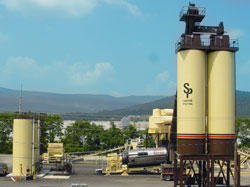Amazing facts about asphalt… The petroleum byproduct was used as a preservative in mummy wrappings in ancient Egypt. Pennsylvania Ave. in Washington, D.C., was the first street in the United States to paved with asphalt; the year was 1876.
These days, as the Commonwealth Transportation Board learned Wednesday from Richard Schreck, executive vice president of the Virginia Asphalt Association, 97% percent of all Virginia primary roads are paved with the material. The 122 asphalt plants in the state employ 6,500 workers and generate $238 million in payroll. Including all of the products and services it purchases — aggregates to mix with the asphalt, trucks to haul it — industry revenues exceed $1 billion a year.
Yet the asphalt industry has fallen on hard times, Schreck said in his presentation. The private sector, which uses asphalt to pave parking lots and private roads, remains in a deep slump. Asphalt plants are operating at only 35% capacity. State road spending, which currently accounts for 58% of revenues, is keeping the industry afloat.
Asphalt is advantageous as a road-paving material because it can be finely engineered to achieve specific performance characteristics, Schreck said. Among its many virtues, he added, asphalt is in theory 100% recyclable. In actual practice, about 80% of the asphalt applied to Virginia roads is recycled. The industry works closely with the Virginia Department of Transportation’s research center in Charlottesville to develop innovative applications such as road surfaces that make less noise when vehicles drive over them to “cold,” on-site recycling of asphalt on repaving jobs.
But the industry sounded less than progressive under questioning from CTB members. “Are you taking advantage of the materials revolution” to develop better products, asked Douglas Koelemay, Northern Virginia district represenative.
“We haven’t begun to scratch the surface” of asphalt’s potential, responded Schreck. But asphalt companies don’t do much research themselves, and universities are cutting back their asphalt labs.
Roger Cole, Richmond district representative, asked if asphalt companies used financial hedging techniques to guard against price fluctuations in commodities such as petroleum. Not really, said Schreck. “There are too many external factors.”
Asphalt’s main competition as a road-building material is concrete. Concrete is rarely used as a surface material anymore but VDOT still relies upon it as a foundational material for high-performance roads.
— JAB



